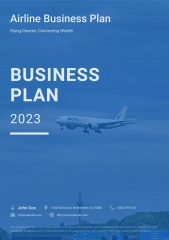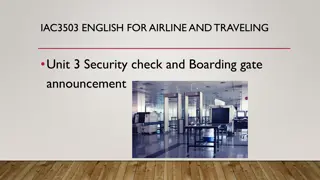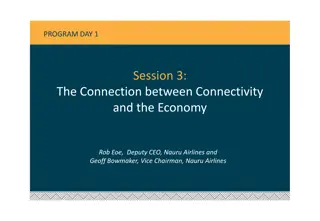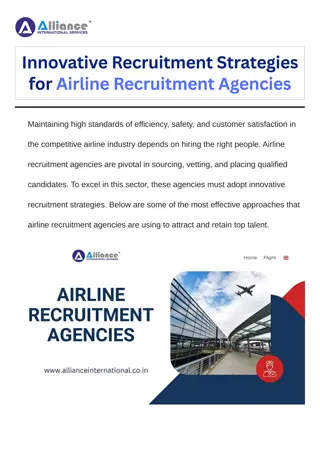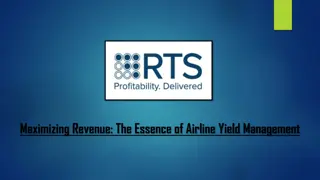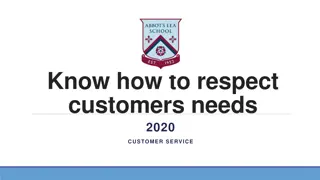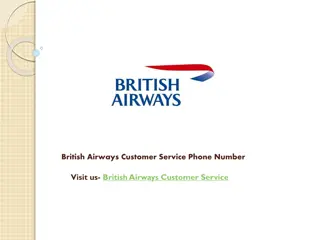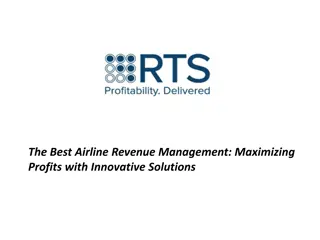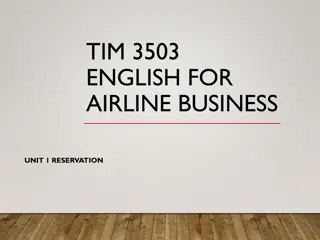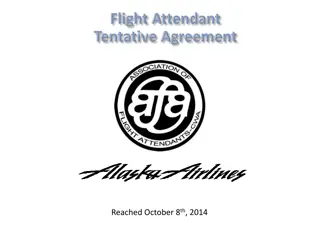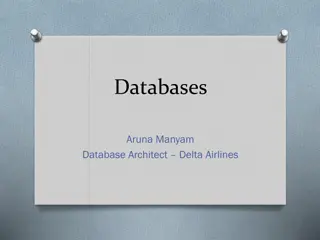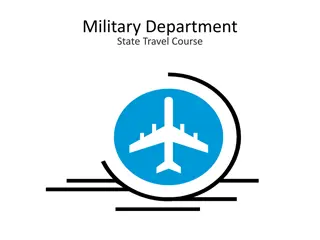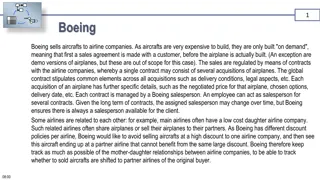Airline Customer Service Policies and Regulations
Explore the essential customer service policies and regulations implemented by governments and airline associations worldwide. Learn about consumer protection laws, airline service standards, unique policies in different countries, and specific plans like the US Customer Service Plan and the EU Regulation 261/2004 for air passenger protection.
Download Presentation

Please find below an Image/Link to download the presentation.
The content on the website is provided AS IS for your information and personal use only. It may not be sold, licensed, or shared on other websites without obtaining consent from the author.If you encounter any issues during the download, it is possible that the publisher has removed the file from their server.
You are allowed to download the files provided on this website for personal or commercial use, subject to the condition that they are used lawfully. All files are the property of their respective owners.
The content on the website is provided AS IS for your information and personal use only. It may not be sold, licensed, or shared on other websites without obtaining consent from the author.
E N D
Presentation Transcript
Learning Objectives After reading this chapter, the reader should be able to: Recognize customer service policy Identify the different consumer protection policies offered by governments and airline associations Understand various policy details and how they protect consumers rights
Airline customer service policy Governments in many countries require airlines to establish customer service policies that protect consumers rights and these policies apply to specific flight routes of various airports. Consumer protection laws are a form of government regulation that aims to protect customers rights and covers most of the issues related to air travels.
Airline customer service policy Airlines must offer transparent information and handle disruptions caused by airline operations, and airline service agents must be well trained to handle customers issues during irregular operations. Under these policies, airlines need to offer adequate assistance and amenities to customers. Otherwise, customers have the right to file a complaint against the airline companies. Some airline associations have developed similar non-mandatory policies and their member airlines have voluntary committed to these policies, which then become the industry s standard.
Airline customer service policy Details regarding airline customer service policy vary according to countries. In addition, airlines are subjected to the policies of both the country of embarkation and disembarkation. According to International Air Transport Association (IATA) s statistics, approximately 60 countries have set up such consumer protection polices and these policies apply to both local and foreign airlines.
Customer Service Plan US The U.S. Department of Transportation first established the Customer Service Plan in September 1999 and it governs all airline operators in the United States of America. The customer service plan includes various topics that protected the rights of customers from using the airline s service. These include fare, delay and cancellations, baggage, refunds and complaints. All US-based airlines and airlines flying into the United States must comply with the Customer Service Plan and state their actions pertaining to each topic.
Protection of Air Passenger EU In 2004, the European Commission (EU) passed regulation No. 261/2004 in 2004 in order to enhance consumer protection policies for passengers flying within and to or from European Union countries. The regulation focuses on consumer benefits and established rules on compensation and assistance to passengers when a customer encounters denied boarding, flight cancellations or extended delays of flights.
IATA Core Principles of Consumer Protection IATA The International Air Transport Association (IATA) is an airline association representing 265 airlines or 83% of total air traffic in the world. In 2013, IATA endorsed a suggested set of core principles of consumer protection regulation for the government. Member airlines can also decide whether they would like to subscribe to IATA s Core Principles of Consumer Protection.
Before flight Inform passengers about the identity of the carrier The airline must be disclosed to customers when making reservations. This includes the air carrier or carriers that are or are likely to act as an operating air carrier, especially in instances of airlines that have a code-sharing agreement, which may cause confusion as customers may sometimes be unaware of the airline they are actually flying with.
Before flight Inform about possible availability of lower fares at direct outlets Airlines must release information about the lowest available appropriate fares to customers through various book channels such as call centers, offices and websites. In addition, service agents at the airport ticket sales office, reservation center and website must always offer the lowest fare available based on customers requested travel dates.
Before flight Honor the agreed fare after payment Airlines are not allowed to increase the airfare after a payment transaction is completed. This ensures that customers are entitled to the original fare and package they have paid for.
Before flight Allow reservations to be held or cancelled Airline must allow a reservation to be held at the quoted fare without payment or cancelled without penalty for a certain period of time after a reservation is made. This allows customers time to compare fares offered by other airlines.
Before flight Provide prompt ticket refunds Airlines must commit to a refund within a limited period after the payment is made. The industry standard is 20 days for cash refund and seven days for credit card purchases.
Before flight Waive ticket restrictions (non-refundable, sequential use of flight coupons) in special circumstances. Airlines can choose to disregard the penalties listed in the customer ticket in special circumstances whereby customers are able to provide proof and evidence of their requests.
Before flight Ensure pricing transparency Prices offered by airlines must list the exact breakdown of the airfare. Additional fees such as taxes, fuel surcharges and convenience fees must be indicated clearly. Airlines must also indicate the exact taxes and fees that make up the cost of the airfare.
Before flight Advise passengers on airline commercial and operational conditions Airlines are responsible for informing customers the following: flight schedule departure and arrival terminal and airport number of en-route stop(s) for a flight change of aircraft, terminal or airport all conditions attached to the total airfare operating carrier and corresponding flight number
Before flight Protect passengers against carrier insolvency Airlines must offer financial compensation to customers in the event of bankruptcy. These can be done via insurance add-ons. As such, airline companies are obliged to offer optional insurance or provide compulsory insurance for their passengers upon booking of air tickets to protect against any potential cases of insolvency.
Before flight Inform passengers of future flight disruptions Airlines are responsible for informing customers of any flight disruptions and changes whenever such information is made available before the actual date of travel.
Before flight Disclose contingency plans, customer service plans and contracts of carriage (carrier website) Airlines must disclose their policies for customers review purposes. Service agents should communicate these policies verbally at the airline contact center. Written forms of information about these policies must also be made available in the official websites.
During the flight Code-share partners maintain service standards Code-sharing is becoming a popular business strategy among airlines. Code-sharing is an agreement made between two different airlines offering services on a single aircraft. Both airlines in a code-sharing agreement must agree with the comparable customer service plan. This ensures that customers receive the same level of customer protection throughout their flight even if they are transferring to other airlines.
During the flight Notify customers of known delays, cancellations and diversions Delay of flights must be announced to customers in a prompt manner. Many airlines use multiple means of contact to notify customers about irregular operations. These include websites, messages (text messages and emails), calling customers by the airline contact center, and making announcements at the airport terminal either via verbally and visually.
During the flight Provide notification of opportunity to deplane Aircrafts are sometimes unable to take off during lengthy tarmac delays. Airlines should not allow aircrafts to remain on the tarmac for more than three hours, and are obliged to return the aircrafts to the parking area where the customers can disembark from the aircraft and return to the terminal. If the aircraft door is still connected to the jet bridge, the cabin crew should inform customers that they can choose to leave the aircraft during this period.
During the flight Assist in case of delay, including long on-aircraft delay During a tarmac delay, airlines should offer customers adequate food and water, no later than 2 hours after the gate departure or touchdown. In addition, airlines must maintain operable lavatories and, if necessary, provide medical attention to those who may need assistance.
During the flight Assist in case of delay, including long on-aircraft delay During denied boarding or flight cancellation, airlines are responsible to either offer customers a refund ticket or make arrangements for alternative means of transportation so that customers can continue their journey. During an extend delay whereby a flight is delayed for five hours or more, customers are entitled to a full refund of their tickets if they choose not to accept the new flight arrangements provided. In events of extended delays or flight cancellations, airlines must offer amenities to customers.
During the flight Handle passenger denied boarding with fairness and consistency Overbooking is a common practice in the airline industry, and airlines may not be able to accommodate all customers on a flight due to either over sales or operational reasons. These customers are known as denied boarding customers. In such instances, airlines should first ask for customers to voluntarily give up their seats in exchange for other forms of compensation. However, there are not enough volunteer customers, airlines will then involuntary deny boarding customer(s) according to their check-in time, travel class, frequent flyer status, and/or ease of re-accommodation.
During the flight Delivery baggage on time Airlines are committed to transport customers baggage on the aircraft. However, delays may sometimes occur. In such events, airlines should make every reasonable effort to return any delayed baggage within 24 hours.
During the flight Properly accommodate disabled customers and those with special needs The policy requires airlines to offer basic and adequate services to all customers without any form of discrimination against passengers on the basis of disabilities. There must be sufficient facilities available at the airport and facilities inside aircraft cabins must be readily accessed by and made usable to any customers with disabilities, including those who require the use of wheelchairs and portable medical electronic devices.
After the flight Submit data for regular consumer report Airlines are required to submit a monthly performance report to the respective authorities, such as the US Department of Transport and the EU European Commission. Information that need to be included in the report includes flight delay data, mishandled baggage statistics, consumer complaints and other incident reports. The information will then be collected and published by the authorities and made available to the general public.
After the flight Handling customers complaints Airlines must respond to customers complaints within a stated time period. According to the European Regulation on passengers rights and US Department of Transport s consumer rule No. 49 U.S.C. 41712, airlines must acknowledge a complaint within 30 days and get in touch with the complainant with a substantive response within 60 days.
Compensation Compensation for lost bag EU Maximum compensation up to EUR 1,220 US Domestic travel: up to USD 3,500 per passenger International travel: up to 1,131 Special Drawing Rights* per passenger.
Compensation Compensation for flight cancellation/denied boarding/delay Denied boarding compensation or late arrival of more than 3 hours Flight within the EU states countries 1,500 km or less 250 Delay and cancellation compensation within the EU. Delayed time 2 hours or more Flight from EU states to non EU Free meal and refreshments, two free international telephone calls, telex or fax messages or emails Refund full cost of the ticket Free meal and refreshment plus two free international telephone calls, telex or fax messages, or emails and hotel accommodation 1,500 km or less 250 5 hours or more Departure is deferred until the next day 1,500 3,500 km 400 Over 1,500 km 400 Over 3,500 km 600
Compensation Delay and cancellation compensation No compensation If the airline offers alternative transportation and the affected passenger arrives at the final destination no later than one hour after the planned arrival time of said passenger's original flight. If the airline offers alternative transportation and the affected passenger arrives at the final destination more than one hour but less than two hours after the planned arrival time of said passenger's original flight. Compensation shall be 200% of the fare or a maximum monetary compensation of USD 675 Compensation shall be 400% of the fare or a maximum monetary compensation of USD 1,350 If the airline is unable to offer alternative transportation and the affected passenger arrives at the final destination more than one hour but less than two hours (US airlines) or four hours (foreign airlines) after the planned arrival time of said passenger's original flight.
Summary With the maturing of the airline industry, governments are developing policies to protect consumers rights. The two major policy makers are the European Union and the US Department of Transport. Airline associations have also developed a set of rules for its members. The consumer protection law is written to protect the consumers right concerning ticket purchase, transparency of information disseminated and the regulation of airline procedures and compensations during instances of flight disruption, such as denied boarding, delay and cancellation. There is also a set of rules protecting customers baggage and personal belongings.


